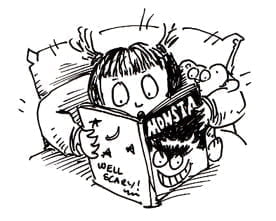 There is only one way to learn how to write well, increase your vocabulary and really begin to understand grammar and language structure. You need to experience writing in action, by reading it and listening to it.
There is only one way to learn how to write well, increase your vocabulary and really begin to understand grammar and language structure. You need to experience writing in action, by reading it and listening to it.
As we read, we imbibe new words, new idioms, new turns of phrases, new ways of breaking the rules of grammar and structure. We learn new ways of telling stories.
Stories grip us wether they are overheard in the playground, on the news, the adverts, the gossip columns, the movies, the latest video game or in books.
Stories are the powerhouse, the fusion and fission of learning to read and write.
Writing can only become imaginative, exciting and able to engage the reader if the writer knows what is possible, if they have read and seen how others do it, if they realise that language is not a straight jacket, but a universe of infinite possibilities.
Stories are what grip us and hold our attention. Stories are what take hold of a child’s imagination and make them want to open the covers of a book, to delve inside and discover what wonders are contained therein.
And I do mean a book. Kindles and tablets are fine when you are confident and know what you are doing, but learning the language is hard work, requiring deep concentration. One thing at a time – beginning, middle and satisfying end.
Kindles and tablets are multifunction shopping and entertainment devices. Distraction is built-in a mere swipe away. Tablets have only one page. They have no identity. They homogenise the content they envelope.
Often, distraction is built right into so-called “reading apps”. You cannot learn to read if the words are jumping up and down and doing the reading for you.
Hearing stories makes children want to read them. To be able to hear stories, to know what those books contain, the stories must be told in the first place. Every other lesson in primary school comes second to story time. Every bedtime routine comes second to story time. Story time is where readers and writers are made.
When that magic moment happens – when children make the connection and realise that the little squiggles on the page are the code that connects them to a multitude of worlds and other people’s lives – they want and need to read books by themselves – hundreds of them! They need books to be available and they might need a bit of help choosing them.
That’s when you might start to engage them with the intricacies of structure and grammar.
A child that reads for pleasure will want to write, to try and do this amazing trick for themselves. They will be bursting to tell about everything they see and hear and experience. Knowing that others have done this before them, and seeing how they did it, will help them tell their own story, be it scientific or spiritual, funny, happy or sad. They will have learned it is possible to make a story so engaging that others will want to read and listen to what they have to say.
Reading is seeing how writing is done.
Reading for pleasure is how we learn to write.
Reading for pleasure comes first.
